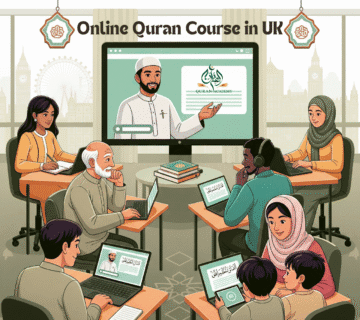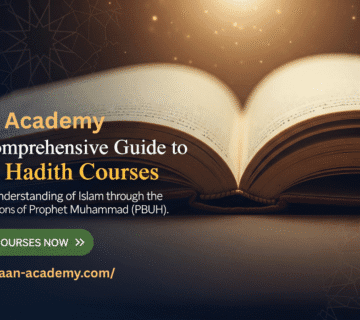An Aqidah course is a structured educational program designed to teach and deepen one’s understanding of the fundamental tenets and core beliefs of Islam. It covers essential Islamic doctrines such as the Oneness of Allah (Tawhid), belief in Angels, Divine Books, Prophets, the Day of Judgment, and Divine Decree, aiming to solidify a Muslim’s faith and provide clarity on foundational theological concepts.
Aqidah Course program and lessons
Our Aqidah Course program covers essential pillars, including:
-
1: Introduction to Aqidah – The Bedrock of Islam
- Lesson 1: Defining Aqidah:
- Linguistic and Shar’i (Islamic legal) definitions of Aqidah.
- The importance and centrality of Aqidah in Islam.
- Why a pure Aqidah is paramount for a Muslim’s faith and actions.
- Lesson 2: Sources of Aqidah:
- The Quran: The ultimate and undeniable source.
- The Authentic Sunnah (Prophetic Tradition): Explaining and complementing the Quran.
- Ijma’ (Consensus) of the Salaf us-Salih (Pious Predecessors) and sound intellect.
- Lesson 3: The Pillars of Iman (Faith):
- An overview of the Six Articles of Faith.
- The interconnectedness of these pillars.
- Lesson 4: Safeguarding Aqidah:
- Understanding the dangers of deviations, innovations (Bid’ah), and polytheism (Shirk).
- The importance of adhering to the methodology (Manhaj) of the Prophet (PBUH) and his companions.
Module 2: The Oneness of Allah (Tawhid)
- Lesson 5: Tawhid al-Rububiyyah (Oneness of Lordship):
- Allah as the sole Creator, Sustainer, Provider, and Controller of all affairs.
- Evidence from the Quran and Sunnah.
- Implications for a Muslim’s understanding of the universe.
- Lesson 6: Tawhid al-Uluhiyyah (Oneness of Worship):
- The essence of “La ilaha illallah” (There is no god but Allah).
- Directing all acts of worship (Salah, Sawm, Du’a, Dhikr, Hajj, Zakat, etc.) solely to Allah.
- Understanding the spiritual and practical manifestations.
- Lesson 7: Tawhid al-Asma wal-Sifat (Oneness of Names and Attributes):
- Affirming Allah’s Beautiful Names and Lofty Attributes as mentioned in the Quran and Sunnah.
- Principles of understanding: Affirmation without resemblance (Tashbeeh), denial (Ta’teel), distortion (Tahrif), or questioning the “how” (Takyeef).
- Lesson 8: Shirk (Polytheism) and its Types:
- Major Shirk (Shirk al-Akbar): Its definition and forms (e.g., worshipping idols, graves, seeking help from other than Allah).
- Minor Shirk (Shirk al-Asghar): (e.g., Ar-Riya – showing off, swearing by other than Allah).
- The dangers and gravity of Shirk.
Module 3: Belief in Allah’s Angels (Mala’ikah)
- Lesson 9: The Nature and Creation of Angels:
- What are angels? Their reality, characteristics, and distinction from humans and jinn.
- Their immense numbers and constant worship of Allah.
- Lesson 10: Specific Angels and Their Roles:
- Jibreel (Gabriel), Mika’il (Michael), Israfeel (Raphael), Malik al-Mawt (Angel of Death).
- The Recording Angels (Kiraman Katibin).
- Angels of the Grave, Guardians of Jannah and Jahannam.
- Lesson 11: The Benefits of Believing in Angels:
- Increased awareness of Allah’s power and dominion.
- Motivation for good deeds and avoidance of evil.
- Comfort and reassurance.
Module 4: Belief in Allah’s Divine Books (Kutub)
- Lesson 12: The Purpose and Significance of Divine Revelation:
- Why Allah sent books to mankind.
- The message of Tawhid in all revealed scriptures.
- Lesson 13: Mentioned Books in the Quran:
- The Scrolls of Abraham and Moses.
- The Tawrah (Torah) revealed to Musa (Moses).
- The Zaboor (Psalms) revealed to Dawud (David).
- The Injeel (Gospel) revealed to Isa (Jesus).
- Their original messages and later alterations.
- Lesson 14: The Quran – The Final and Preserved Revelation:
- Its divine origin and miraculous nature.
- Its comprehensive guidance and preservation by Allah.
- Its status as the ultimate authority for Muslims.
Module 5: Belief in Allah’s Prophets and Messengers (Anbiya wal-Rusul)
- Lesson 15: The Necessity of Prophethood:
- Why Allah sent Prophets and Messengers.
- Their role as guides and examples for humanity.
- Lesson 16: Key Prophets Mentioned in the Quran:
- Stories and lessons from Prophets like Adam, Nuh (Noah), Ibrahim (Abraham), Musa (Moses), Isa (Jesus).
- Their shared message of Tawhid.
- Lesson 17: Prophet Muhammad (PBUH) – The Seal of the Prophets:
- His life (Seerah), message, and unique status.
- The importance of following his Sunnah.
- Proof of his Prophethood.
- Lesson 18: The Qualities and Infallibility of Prophets:
- Their truthfulness, trustworthiness, and perfection in conveying the message.
- Understanding their protection from major sins.
Module 6: Belief in the Day of Judgment (Yawm al-Qiyamah)
- Lesson 19: The Signs of the Hour:
- Minor Signs (e.g., spread of ignorance, rampant disobedience).
- Major Signs (e.g., Dajjal, descent of Isa, Gog and Magog, the Smoke, the Beast).
- Lesson 20: The Stages of the Hereafter (Akhirah):
- Life in the Grave (Barzakh): The questioning and initial experiences.
- The Resurrection (Ba’th): The blowing of the Trumpet.
- The Gathering (Hashr): Assembly of all beings for judgment.
- Lesson 21: The Reckoning and Its Tools:
- The Book of Deeds.
- The Scale of Deeds (Mizan).
- The Hawd (Prophet’s Pond).
- The Sirat (Bridge over Hellfire).
- Lesson 22: Jannah (Paradise) and Jahannam (Hellfire):
- Descriptions of their nature, inhabitants, and eternal consequences.
- The ultimate rewards and punishments.
Module 7: Belief in Divine Decree (Qadar)
- Lesson 23: Understanding Qadar – The Four Levels:
- Allah’s Knowledge (Ilm).
- Allah’s Writing (Kitabah) in the Preserved Tablet.
- Allah’s Will (Mashii’ah).
- Allah’s Creation (Khalq) of all things.
- Lesson 24: Human Free Will and Responsibility:
- Reconciling Qadar with human choice and accountability.
- The concept of striving and reliance on Allah (Tawakkul).
- Lesson 25: The Benefits of Believing in Qadar:
- Patience during hardship.
- Gratitude during ease.
- Removal of anxiety and despair.
- Reliance and trust in Allah.
Module 8: Practical Applications & Strengthening Faith
- Lesson 26: The Practical Impact of Sound Aqidah on Daily Life:
- How correct belief influences worship, character, and interactions.
- Building a resilient and confident Muslim identity.
- Lesson 27: Al-Wala’ wal-Bara’ (Loyalty and Disavowal for Allah’s Sake):
- Understanding love for Allah and His righteous servants, and disavowal of disbelief and evil.
- Lesson 28: Addressing Contemporary Doubts and Misconceptions:
- Common challenges to faith in the modern world and how to address them with sound Aqidah.
- Lesson 29: Continuous Learning and Purification of Belief:
- The ongoing journey of seeking knowledge and purifying one’s heart.
- Lesson 30: Course Review and Open Discussion/Q&A.
- Lesson 1: Defining Aqidah:
islamic Aqidah
Islamic Aqidah (العقيدة الإسلامية) refers to the fundamental and non-negotiable tenets of faith that a Muslim must believe in. It encompasses the core doctrines and principles that form the foundation of a Muslim’s belief system, providing a clear framework for understanding God, the universe, and humanity’s purpose.
In essence, it’s the creed or dogma of Islam, outlining what one must affirm in their heart with conviction.
The primary pillars of Islamic Aqidah are often summarized in the six articles of faith:
- Belief in Allah (God): The absolute Oneness of Allah (Tawhid), His unique attributes, and His exclusive right to be worshipped. This is the cornerstone of Islam.
- Belief in His Angels (Mala’ikah): Understanding that angels are created beings who worship Allah and carry out His commands.
- Belief in His Divine Books (Kutub): Accepting all the scriptures revealed by Allah to His prophets, including the Torah, Psalms, Gospel, and ultimately the Quran as the final and complete revelation.
- Belief in His Messengers and Prophets (Rusul wal-Anbiya’): Affirming the prophethood of all messengers sent by Allah, with Muhammad (peace be upon him) being the final prophet.
- Belief in the Day of Judgment (Yawm al-Qiyamah): Conviction that there will be a day when all humanity will be resurrected and judged for their deeds, leading to either Paradise (Jannah) or Hellfire (Jahannam).
- Belief in Divine Decree (Qadar): Accepting that everything that happens is by Allah’s knowledge and will, while still affirming human free will and responsibility for actions.
A strong and clear understanding of Islamic Aqidah is considered essential for a Muslim because it:
- Provides clarity and certainty in faith, removing doubts and confusion.
- Forms the basis for all acts of worship (Ibadah), ensuring they are performed with sincerity and correct intention.
- Guides moral and ethical behavior, as one’s actions are rooted in their core beliefs about Allah and accountability.
- Offers peace of mind and tranquility (Sakinah), knowing that everything is ultimately in Allah’s hands.
- Distinguishes true Islamic belief from deviations, innovations (Bid’ah), or polytheism (Shirk).





No comment